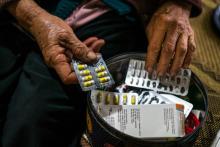WHO and Tanzania Ministry of Health take action to improve access to essential medicines for epilepsy and Parkinson disease
Dar es Salaam - Tanzania is paving the way in the African region on the implementation of the Intersectoral Global Action Plan on epilepsy and other neurological disorders 2022-2031 (IGAP). Using epilepsy and Parkinson disease as tracer conditions, WHO and Tanzania Ministry of Health are working together to identify barriers to medication access and interventions to improve access, in collaboration with local partners, including people with lived experience, health care providers and civil society representatives.
According to Dr Charles Sagoe-Moses, WHO Representative to Tanzania, “Epilepsy and Parkinson disease are a major cause of disability and cause a significant impact in Tanzania. It is encouraging to see the country not sparing efforts to address issues relating to access to medicines for these diseases at multiple levels. These efforts are great examples of how countries can take action to achieve the goals and visions set out by IGAP.”
In May 2023, Tanzania was among the first countries to host a workshop on the implementation of IGAP following its launch. The workshop involved sharing the results of an assessment on access to medication for neurological disorders and laid the groundwork for the national-level implementation of IGAP. The activities focused on epilepsy and Parkinson disease, identifying key components that impact access to medicines for these conditions and developing actions to address these issues. In September 2023, an additional meeting with all partners was convened in Moshi to ensure the continuity of actions and assess the progress that had already been achieved.
On his side, Dr. Omary Ubuguyu, Assistant Director for NCDs at the Ministry of Health noted “Tanzania is proud to be working with WHO to ensure that people with neurological disorders can access and afford the medicines to treat these conditions. Our priority is to ensure that the population can have access to the care and support that they need”
Substantial progress has been achieved by the Ministry of Health as a result of these activities. A national coordination committee for epilepsy and other neurological disorders is being established to ensure technical support to policymakers and maintain neurological disorders as a priority in the country. Further, Tanzania’s Medical Stores Department is conducting special procurements of medicines for neurological disorders in order to address the lack of access to these medicines, including levodopa/carbidopa for Parkinson disease and several anti-seizure medicines.
Finally, in a significant step, Tanzania’s National Health Insurance Fund package 2024 (last updated in 2016) now includes several medicines for neurological disorders, such as levetiracetam, donepezil, levodopa/carbidopa, selegiline and baclofen, as well as additional preparations of lamotrigine and carbamazepine. These actions represent a major step towards including Parkinson disease and epilepsy as priorities in the public health agenda of Tanzania.
Population-based prevalence studies in Tanzania estimate that 450,000 people live with epilepsy, and 36,000 live with Parkinson disease. Both disorders exhibit alarmingly high diagnosis and treatment gaps. For instance, of the estimated 450,000 people with epilepsy, only 166,788 received treatment, according to the District Health Information System (DHIS) 2022 data. Globally, neurological disorders are the leading cause of disability-adjusted life years (DALYs) and the second leading cause of death. Addressing this impact requires well-prepared and supported health systems to provide adequate care and improve the health and well-being of people living with neurological disorders. This burden cannot be reduced without reliable and equitable access to essential medicines. A global target set by IGAP aims for 80% of countries to provide essential medicines and basic technologies required to manage neurological disorders in primary care by 2031. Efforts in Tanzania demonstrate that achieving this goal is possible.
Communications Officer
WHO Country Office, United Republic of Tanzania
Tel: +255 744377899 (Phone)
Email: adjeidum [at] who.int (adjeidum[at]who[dot]int)
Tel: +255 754 270 608
Email: nanaia [at] who.int (nanaia[at]who[dot]int)




